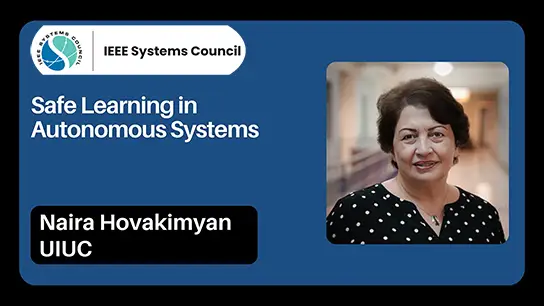Research at the Intersection Between Robots and Play: Designing Robots for Children’s Healthcare
Ayanna Howard
-
Members: FreeRAS
IEEE Members: Free
Non-members: FreeLength: 00:23:58
31 May 2017
Video Description
There are an estimated 150 million children worldwide living with a disability. For many of these children, physical therapy is provided as an intervention mechanism to support the child’s academic, developmental, and functional goals from birth and beyond. With the recent advances in robotics, therapeutic intervention protocols using robots is now ideally positioned to make an impact in this domain. There are numerous challenges though that still must be addressed to enable successful interaction between patients, clinicians, and robots - developing interfaces for clinicians to communicate with their robot counterparts; developing learning methods to endow robots with the ability to playfully interact with the child; and ensuring that the robot can provide feedback to the parent and clinician in a trustworthy manner.
I will discuss the role of robotics and related technologies for pediatric therapy and highlight our methods that bring us closer to this goal. I will present our approaches and preclinical studies in which these technologies address real-life developmental goals for children with special needs.
ICRA 2017
The 2017 IEEE International Conference on Robotics and Automation (ICRA) was held from May 29 to June 3, 2017 at Sands Expo and Convention Centre, Marina Bay Sands in Singapore. ICRA is IEEE Robotics and Automation Society's flagship conference and is a premier international forum for robotics researchers to present their work. The conference theme, “Innovation, Entrepreneurship, and Real-world Solutions”, underscores the need for innovative R&D talent, dynamic and goal-driven entrepreneurs and practitioners using robotics and automation technology to solve challenging real-world problems such as shortage of labour, an ageing society, and creating sustainable environments.
Speaker
Ayanna Howard, Ph.D. is Professor and Linda J. and Mark C. Smith Endowed Chair in Bioengineering in the School of Electrical and Computer Engineering at the Georgia Institute of Technology. She also holds the position of Associate Chair for Faculty Development in ECE. She received her B.S. in Engineering from Brown University, her M.S.E.E. from the University of Southern California, and her Ph.D. in Electrical Engineering from the University of Southern California.
Her area of research is centered around the concept of humanized intelligence, the process of embedding human cognitive capability into the control path of autonomous systems. This work, which addresses issues of autonomous control as well as aspects of interaction with humans and the surrounding environment, has resulted in over 200 peer-reviewed publications in a number of projects – from scientific rover navigation in glacier environments to assistive robots for the home. To date, her unique accomplishments have been highlighted through a number of awards and articles, including highlights in USA Today, Upscale, and TIME Magazine, as well as being named a MIT Technology Review top young innovator and recognized as one of the 23 most powerful women engineers in the world by Business Insider.
In 2013, she also founded Zyrobotics, which is currently licensing technology derived from her research and has released their first suite of therapy and educational products for children with differing needs. From 1993-2005, Dr. Howard was at NASA's Jet Propulsion Laboratory, California Institute of Technology. She has also served a term as the Associate Director of Research for the Georgia Tech Institute for Robotics and Intelligent Machines and a term as Chair of the multidisciplinary Robotics Ph.D. program at Georgia Tech.
There are an estimated 150 million children worldwide living with a disability. For many of these children, physical therapy is provided as an intervention mechanism to support the child’s academic, developmental, and functional goals from birth and beyond. With the recent advances in robotics, therapeutic intervention protocols using robots is now ideally positioned to make an impact in this domain. There are numerous challenges though that still must be addressed to enable successful interaction between patients, clinicians, and robots - developing interfaces for clinicians to communicate with their robot counterparts; developing learning methods to endow robots with the ability to playfully interact with the child; and ensuring that the robot can provide feedback to the parent and clinician in a trustworthy manner.
I will discuss the role of robotics and related technologies for pediatric therapy and highlight our methods that bring us closer to this goal. I will present our approaches and preclinical studies in which these technologies address real-life developmental goals for children with special needs.
ICRA 2017
The 2017 IEEE International Conference on Robotics and Automation (ICRA) was held from May 29 to June 3, 2017 at Sands Expo and Convention Centre, Marina Bay Sands in Singapore. ICRA is IEEE Robotics and Automation Society's flagship conference and is a premier international forum for robotics researchers to present their work. The conference theme, “Innovation, Entrepreneurship, and Real-world Solutions”, underscores the need for innovative R&D talent, dynamic and goal-driven entrepreneurs and practitioners using robotics and automation technology to solve challenging real-world problems such as shortage of labour, an ageing society, and creating sustainable environments.
Speaker
Ayanna Howard, Ph.D. is Professor and Linda J. and Mark C. Smith Endowed Chair in Bioengineering in the School of Electrical and Computer Engineering at the Georgia Institute of Technology. She also holds the position of Associate Chair for Faculty Development in ECE. She received her B.S. in Engineering from Brown University, her M.S.E.E. from the University of Southern California, and her Ph.D. in Electrical Engineering from the University of Southern California.
Her area of research is centered around the concept of humanized intelligence, the process of embedding human cognitive capability into the control path of autonomous systems. This work, which addresses issues of autonomous control as well as aspects of interaction with humans and the surrounding environment, has resulted in over 200 peer-reviewed publications in a number of projects – from scientific rover navigation in glacier environments to assistive robots for the home. To date, her unique accomplishments have been highlighted through a number of awards and articles, including highlights in USA Today, Upscale, and TIME Magazine, as well as being named a MIT Technology Review top young innovator and recognized as one of the 23 most powerful women engineers in the world by Business Insider.
In 2013, she also founded Zyrobotics, which is currently licensing technology derived from her research and has released their first suite of therapy and educational products for children with differing needs. From 1993-2005, Dr. Howard was at NASA's Jet Propulsion Laboratory, California Institute of Technology. She has also served a term as the Associate Director of Research for the Georgia Tech Institute for Robotics and Intelligent Machines and a term as Chair of the multidisciplinary Robotics Ph.D. program at Georgia Tech.


